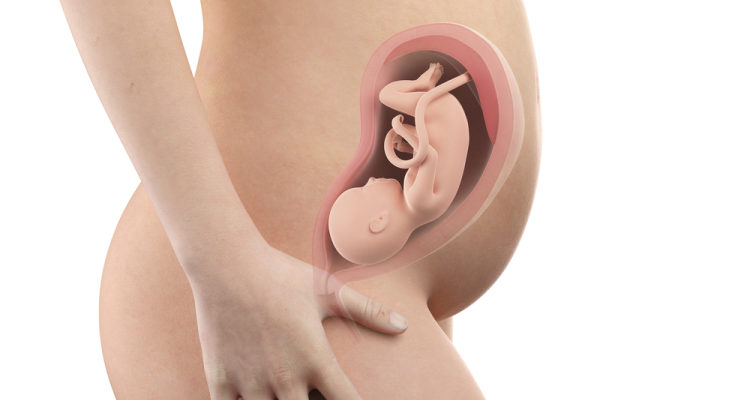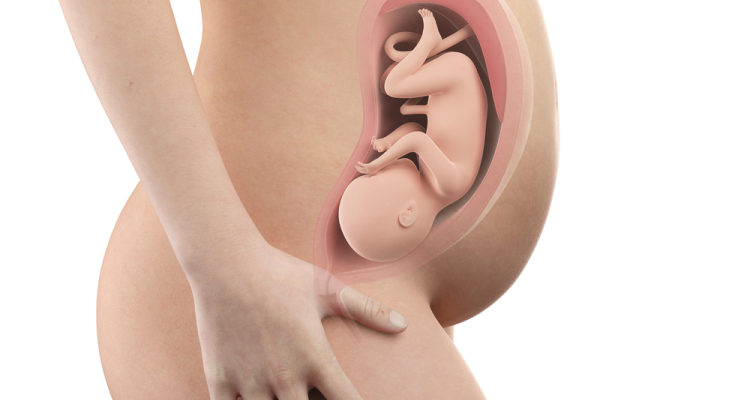Week 9

Many pregnant mothers wonder how their 9-week-old fetus has developed. So let's explore with aFamilyToday Health now!
The fetal heart rate is one of the most exciting sounds a parent can hear while the baby is still in the womb . So you know how the baby's fetal heart rate formed and changed?
Since pregnancy , one of the first milestones parents expect is hearing a fetal heartbeat, a sign that the fetus is growing . This sound will give you some peace of mind about the baby in the womb. Although not much different from the normal heart rate, the fetal heart rate always has major changes occurring to the heart and circulatory system every week.
At 4 weeks , the heartbeat is still inaudible, but blood vessels have formed inside the embryo. It will soon develop into the heart and circulatory system of the fetus. In the first stage, the heart is like a tube, which then twists and divides, eventually forming the heart and valves (opening and closing to release blood from the heart to the body).
In fact, by week 5 , the fetal heart canal begins to beat suddenly but you still have not heard. During the first weeks of life, precursor blood vessels also begin to form in the embryo.

By 6 weeks, the fetal heart can now beat 80 times / minute. The fetal heart now has 4 empty compartments, each with an entrance and exit to allow blood to flow in and out of each compartment. If developing normally, in 2 weeks, the heart rate will increase 150 times / minute. The fetal heart rate is now twice as fast as your heart rate.
With the above growth, you can hear your baby's beats for the first time around 9 or 10 weeks of pregnancy. Around this time, the fetal heart usually beats about 170 times / minute, this number will decrease gradually until the baby is born. To be able to clearly hear your baby's heartbeat, your doctor or nurse will place a hand held ultrasound device called a Doppler on your abdomen to amplify the sound of your baby's heartbeat.
You do not worry, because there may be due to fetal hiding in the corner of the uterus or is turned off making equipment Ultrasonic Doppler difficult to determine the exact heart rate. Over the next few weeks, the magic sounds of your baby's heartbeat will definitely be heard.
At 11 weeks , your doctor will do an ultrasound to check if the heart is still healthy by examining for structural problems in the fetal heart (known as a diagnosis of congenital heart defect ). Each year about 36,000 babies are born with a congenital heart defect. This is the most common type of disease.
Currently, there is no medicine to treat congenital heart defects for the fetus, so you should give birth at a hospital or major medical center, where there is a full range of newborn heart care equipment. .
Sometimes doctors have to perform surgery to treat a congenital heart defect in a baby right after birth. Alternatively, you can also wait until your baby gets older or receive medical treatment. If you find out that there is a problem with your fetal heartbeat, your doctor will prescribe medication to reduce your risk of preterm birth .
The good news is that most congenital heart defects can be treated if caught early and promptly. Children with congenital heart disease need to see a cardiologist periodically from baby to adulthood.

Around the 20th week of your pregnancy, you should begin to hear your baby's heartbeat through a stethoscope. If the doctor needs to hear clearly and observe more closely, an echocardiogram will be performed. This is a special ultrasound that checks the fetal heart between 18 and 24 weeks. For pregnant mothers with a family history of congenital heart defects, diabetes or autoimmune disease , you are sure will definitely need to have this type of ultrasound.
At 24 weeks , the fetal heart rate is about 140 beats per minute. By the end of 25 weeks , capillaries (the smallest blood vessels) are slowly forming and the blood is fully transported to these capillaries. Capillaries carry the amount of oxygen in the blood through the heart's arteries to the tissues in the fetus and then the deoxygenated blood is sent back to the lungs. This action makes the tiny blood vessels the center of the circulatory system.
The fetal circulation system will continue to develop in preparation for birth around 40 weeks. While the fetal circulation system develops rapidly throughout pregnancy, it performs a rather different function. when the baby was born.
Remember, before you are born, your baby's lungs are still not working. The reason is that the fetus does not breathe through the lungs while still in the uterus, but the umbilical cord and the placenta connected to the mother will take care of those functions. The moment of birth is when the baby's first breathing officially begins.
The circulatory system relies on the umbilical cord to provide the fetus with oxygen-rich and nutrient- rich blood , transport what your baby needs from you and then remove the non-oxidized blood and waste back through movements. umbilical vein and vein.
Another difference is that the fetal heart has 2 shunts to keep blood from entering the lungs (because they are not needed in the uterus). The fetus has a pulmonary artery (from the heart to the lungs) and the aorta (from the heart to the body), which is connected to another blood vessel called the ductus arteriosus. This also helps to release blood from the lungs in the uterus. Eventually, the baby has an oval opening (which opens only in the uterus, usually between the heart's upper left chambers (the atria), again removing blood from the lungs.
However, when the baby is born, all of these differences in the fetus will disappear completely. When the umbilical cord is cut, the baby's lungs draw in air and the circulatory system will pause. The shunt begins to close and all systems are working for the baby's survival.
The process from when a baby is formed in the womb to birth goes through many stages. Mother should always monitor the health during pregnancy according to the doctor's instructions to promptly prevent diseases that the baby may have. At the same time, mothers should also equip themselves with healthy living habits to help their baby stay healthy when born.
Many pregnant mothers wonder how their 9-week-old fetus has developed. So let's explore with aFamilyToday Health now!
11 weeks fetus, baby's face continues to develop, mainly in the ear area, the head is about half the length of the body.
The development of the fetus changes with each stage. aFamilyToday Health shares with you everything you need to know about your 24-week-old fetus.
29 weeks pregnant will be the time when the mother is 7 months pregnant. During this time, the baby has reached a certain level of development in size, weight ...
The 33-week-old fetus was able to hear, feel and even see some. Baby can also dream at this stage!
Pregnant mothers often worry during labor. 3 exercises aFamilyToday Health will help pregnant mothers prepare for psychology and good health when pregnant women are in labor.
Learning about the effects of abortion on aFamilyToday Health tells you the link between abortion and its potential risks and when it is safe to get pregnant again.
How do mothers elect vitamin D supplements? Please share from an expert at aFamilyToday Health to know food sources and when to supplement this vitamin.
Join aFamilyToday Health to learn about eggs and sperm, how they meet, and about conception and the formation of the fetus.
aFamilyToday Health - A post about the breast changes of pregnant women and how to help you overcome the discomfort of these changes.








